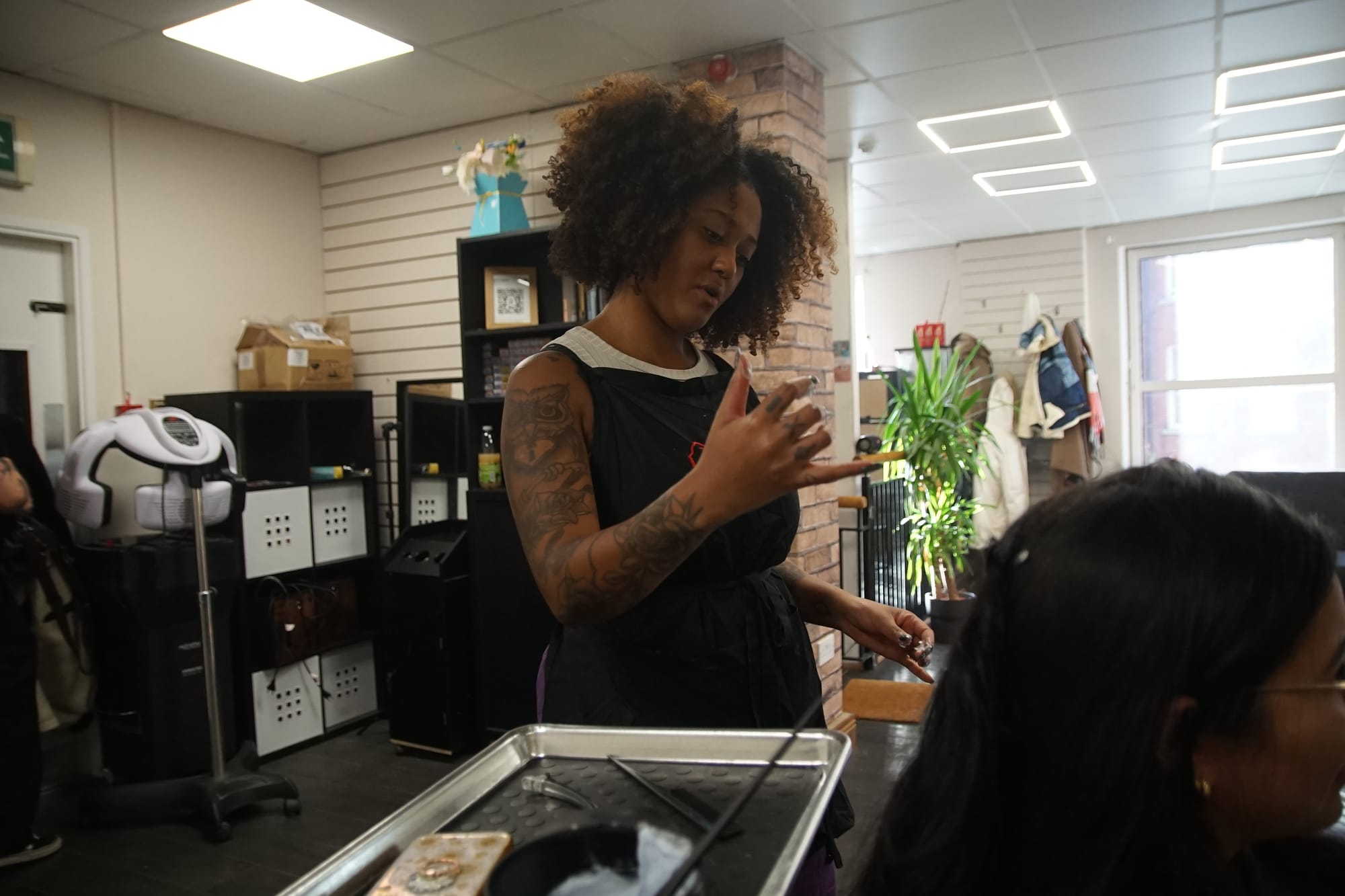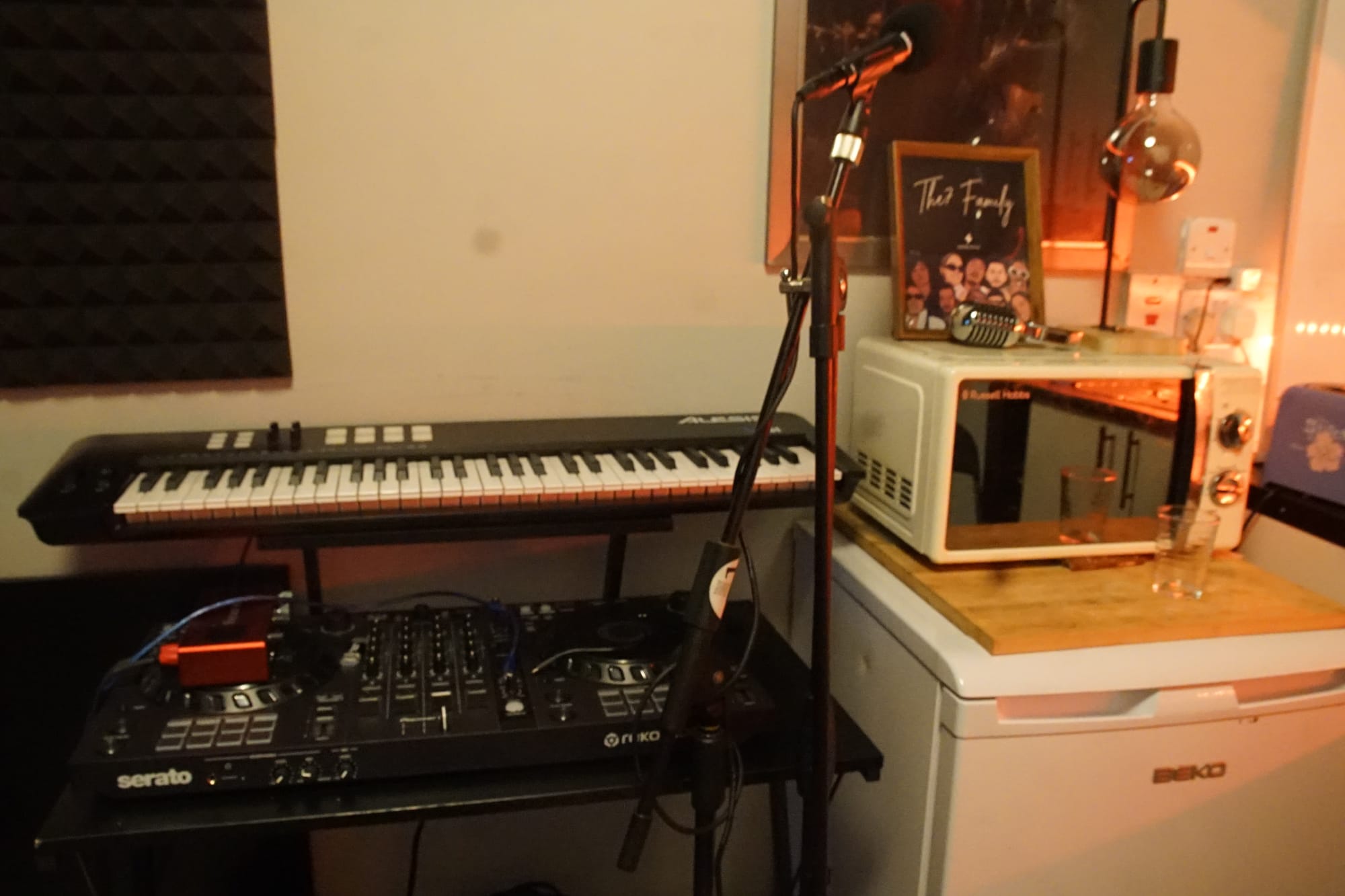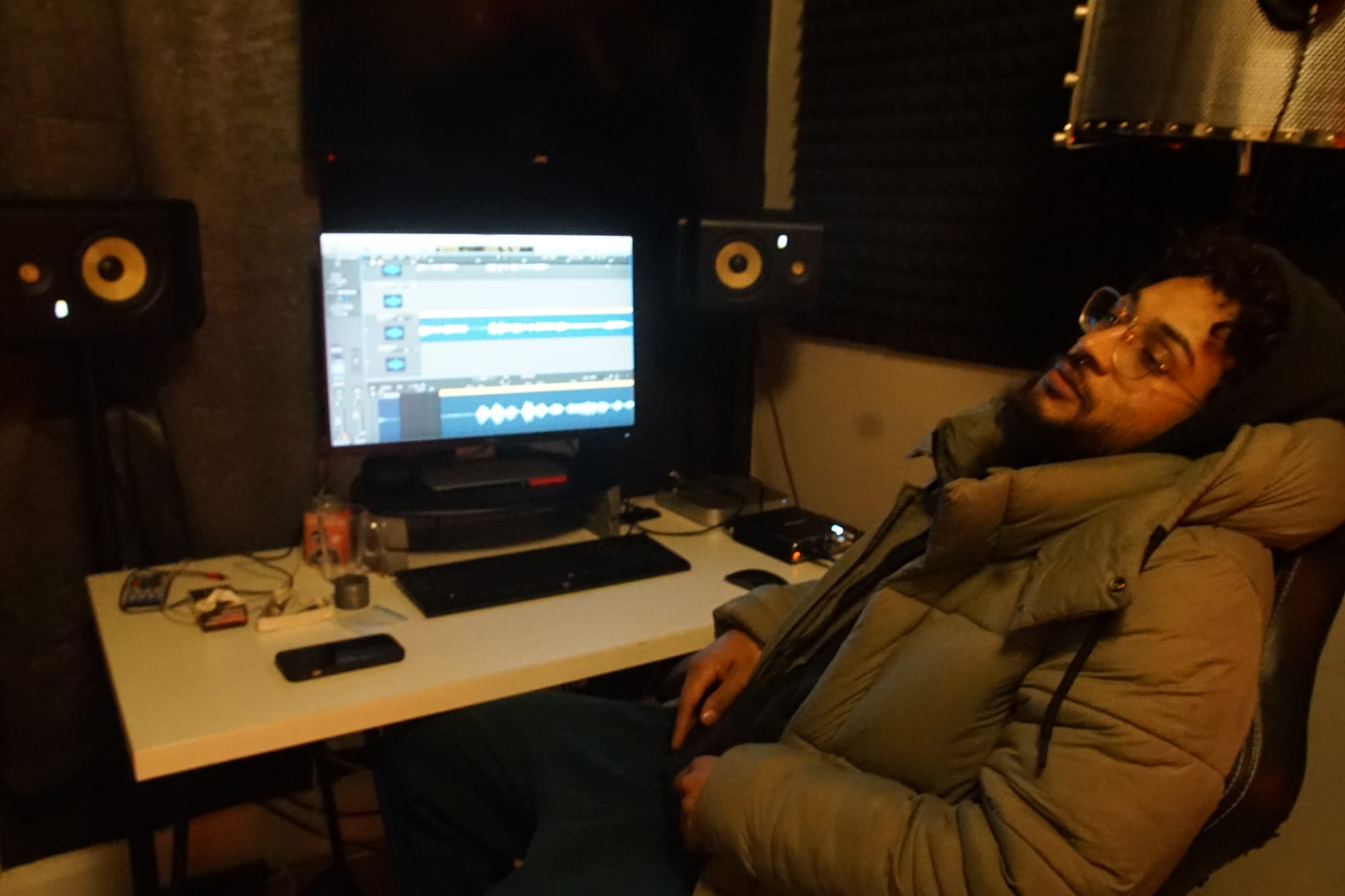What’s the best way to tell area residents about plans for a new asylum shelter nearby?
The government should tell communities directly about plans for new asylum shelters, some activists and politicians say.
“Everyone one that started The7 I met here,” said Tharick Benck recently, during a shift in the Vintage Studio.

“How are you, bro? Are you okay?” said Tharick Benck, turning to a customer who had just walked in. “It’s been a long time since I’ve seen you.”
“Do you have a booking?,” asks Anna Cléa de Mello Oliveira.
The customer was tentative. “No, but is it possible to get a haircut now?”
It was 11:15am on Wednesday 20 November at the Vintage Studio, a beauty salon and barber shop on Capel Street and, luckily, Benck had a gap in his schedule.
He draped a black cape around the guy’s shoulders, and flicked on the electric clippers and the buzzing blended with the sound of gospel rap as the man stared towards the mirror on the wall in front of him.
Stuck to it was a picture of Benck giving a man a haircut. So too were several stickers — one with the number 7, repeated three times, and another with the logo of The7 Productions, an independent record label whose members all found each other right here in the salon.
***
“Everyone one that started The7 I met here,” says Benck. The first seven members, all independent artists, came together in the middle of 2021. Four more have joined and one has left the label since.
Some were staff. Benck and Ingrid Sales, now his wife and also one of the label’s founders, met while working together in the salon. Oliveira works as the receptionist, and Igor Pereira as a hair stylist.
Other members were walk-in customers. All had overlapping aspirations.
Benck, whose artist name is KING THC, moved to Ireland from the favela of Praia Grande in Brazil with the goal of making a living through his music, he says. “I wake up every morning believing that rap will turn my life around.”
He doesn’t have a Plan B, he says. “There’s no college or further education courses. All I have is my music to make it, and I have my work in the salon to finance my dream.”
While Benck was focused on making a living with his music, Oliveira was searching for a photography studio.
In the middle of 2021, they decided to find a space where they could create both. They first rented a room in someone else’s house. Just for a few months, says Benck.
Then three years ago, they and the other founders rented a commercial unit on Sherrard Street Lower, says Oliveira.
“We built the music studio gradually, and everyone contributed what they could,” says Kaik Taynã Marques de Melo, their music engineer.
***
Before meeting Benck, Oliveira wasn’t that clued in to rap. That has changed. “When you spend time with him, that’s all he listens to,” she says, of Benck.
Oliveira values the sense of community in rap, she says, “It is not just a music style; I feel it’s a culture. They are really united and help each other a lot.”
She likes other genres too, though. “I really like R&B and MPB,” Oliveira says. Her first idol was the Brazilian MPB singer Ana Carolina, but she grew up listening to Adriana Calcanhoto and Marisa Monte too.
She used to think rap was misogynistic, she says. “I didn’t see many examples of women in rap.”
But the lyrics she listens to are far from stereotypical, she says. “There are many types of rap that don’t focus on women, money, or sex. There are lots of artists who address deeper topics like social issues, racism, and everyday life.”
The7 Productions is in that vein, she says.
Says Benck: “We sing about the realities we live.”
“The cold weather, sometimes when our partner is upset, a new pair of sneakers we bought,” he says, “a week of hard work, missing our mum, and the desire to be with our younger siblings.”
Sometimes, members perform in Portuguese and other times in English, says Benck. Still, audiences have seemed at gigs to enjoy themselves, he says. “They jumped as if they understood us.”
When the songs are in Portuguese, the audience can expect a lot of groove. “Groove is something you feel and transmit, and we transmit that,” he says.

Sales sees rap as a route to financial freedom, she says. “For many black people, rap brings freedom.”
Rappers and MCs in Brazil can change their lives in favelas, reshaping their families’ narratives through music, says Sales, who is from a favela in São Paulo.
Without this, many might have ended up involved in crime or trafficking, she says
***
At the moment, the collective charges emerging artists by the hour to record at the studio, and produce tracks. The money that it makes from that, and from streaming platforms, is still just symbolic, says Melo, the music engineer.
Side jobs cover studio rent and overhead expenses. All the artists chip in with whatever they can afford without too much strain, he says.
Oliveira, who does photos for The7 Productions, has earned money from photography for about three years now. But she is hesitant to take the leap into that full-time, she says.
The salon gives her a stable income.
Her photography client list is growing, she says, and that’s key. “You need to put yourself out there, send emails, and visit places,” says Oliveira.
Her girlfriend has also pressed how important it is to find a niche, says Oliveira. Thinking about that, Oliveira realised she identified most with the LGBTQ+ community and women.
She began searching, and discovered the Outhouse, just down along Capel Street, says Oliveira.
In her first week in Dublin, she was living right across from the centre, where she saw a huge LGBTQ+ flag. “I remember it gave me the sensation of welcoming to see a big flag there,” she says.
She sent them an email. They needed a photographer, and they began working together, she says.
***
In the salon, Benck brushes strands of cut hair from the customer’s neck. The fade is a popular style, he says.
It’s what Benck did for Desmond dos Santos Miguel when he met him.
Miguel, known when performing as Tutu BigHomie, had heard about Benck through mutual friends, he says.
Miguel dropped into the salon one day in April 2022 and Benck – though technically fully booked – squeezed him in, he says.
“I saw someone that I felt I already knew,” says Benck, of that first encounter.
Miguel visited the music studio on Sherrard Street Lower that same day, says Miguel, who is a singer and music producer. Benck gave him a key.
“He has the spirit,” says Benck.


Benck reads a lot into appearances, he says. “Everything about our appearance, I believe, connects to our ancestors.
“My family has a shamanic background. My mum and grandmother are shamanic. Our hair, tattoos, and the way we dress and paint are all linked to our ancestry,” says Benck.
Benck has a number 7 tattoo on his face. But “I don’t see a tattoo, even on the face, as aggressive – it’s a connection to our roots”, he says.
It was also a connection to Tutu.
“When I met Tutu, we both had the same tattoo: the number 7 in his arm,” says Benck. “He also has the same tattoo from Michelangelo’s painting.”
“Tutu brought life to the 7th,” says Benck. “He brought conviction that things will change.”
Miguel grew up in Luanda, the capital of Angola. His parents come from villages where music is an integral part of daily life, he says.
“Everyone in Angola needs to know how to dance,” he says. Traditional Semba moves, and derivatives like the upbeat Kuduro and slower Kizomba.
Before becoming a singer and producer, Miguel was a dancer. It was through dancing that he made friends, he says.
“Nowadays, as an adult, I can see I grew up with people who could not read or write, who did not have access to school or food,” he says.
He wanted to break free from the violence around him but still keep friendships, he says. So, he offered to write lyrics and songs that reflected his friends’ everyday lives.
“You need to be cool to have friends, avoid bullying, and have people who support and protect you,” he says,
His father worked hard to give him and his family a better life, says Miguel. His life changed when his father enrolled him in college in Lisbon.
Living away from his family, he started to divert part of the allowance his father sent him to pay a producer. The cost drove him to learn the ropes of music production. “It was too much money,” he recalls.
After graduating in management, he built a music production studio from scratch and began to earn from his music.
To provide his family – his wife and son – with a better quality of life, after the pandemic he moved to Ireland, says Miguel.
He faced ups and downs. At first, he stayed with his aunt, who was very kind to him. Later, he moved to a homeless hostel.
He learnt English, worked in a warehouse, and sent money back to his family, he says. “She bought things we never had before.”
His time in a hostel was eye-opening, he says. “You would see people in suits and ties on the street and you wouldn’t imagine they are homeless.”
As his life in Dublin stabilised, he set about creating his mixtape. “It’s a combination of four years of making music,” says Miguel. The themes are centred around family and spirituality, he says.
“All the songs on his album are freestyle,” he says. He didn’t stop to write them. The release of his album PAPI IV is planned for 13 December.
On 29 November, he released the song “A Tropa Bate” from the new album, along with its music video.
He also featured in “Louco,” a recent release through The7 Productions. The video was filmed in Vintage Studio.
“Everything revolves around here,” says Oliveira.
Get our latest headlines in one of them, and recommendations for things to do in Dublin in the other.